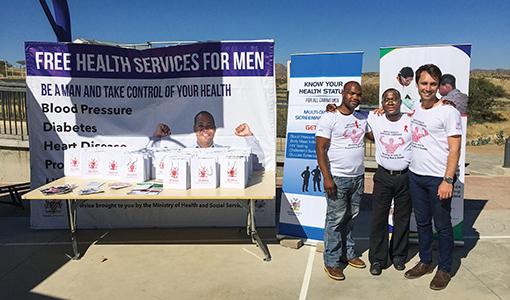-
About
- Departments & Offices
-
Academics
- Physician Assistant
- Special Master’s (MBS)
-
Admissions & Financial Aid
- Tuition & Fees
-
Student Life
-
- Student Resources by Program
- Academic & Student Support
- Wellness & Wellbeing
- Student Experience
- Events & Traditions
-
-
Research
- Research Labs & Centers
-
Local & Global Engagement
- Global Health Programs
- Community Engagement
New Worldview
School of Medicine students evaluate programs and policies to combat HIV in Namibia

Colin Russell, M20, arrived in Namibia in the summer of 2017, expecting to evaluate the impact of a mobile clinic focused on men’s health. But it wasn’t ready yet. So he assisted wherever he could: scouting neighborhoods for places to park the van, developing pamphlets, printing maps.
Russell, who is working toward a dual degree in medicine and public health, was in the southwestern African nation to complete his public health fieldwork. Although about one in seven adults in Namibia is HIV positive, the country’s public health efforts have been encouraging: About 80 percent of those with the virus are receiving life-saving antiretroviral therapy, one of the highest rates in sub-Saharan Africa. To learn from health-care practitioners there and help inform the government’s policies, Tufts University School of Medicine students conduct research on HIV and related health issues in partnership with the country’s Ministry of Health and Social Services for eight weeks each summer.
Later last summer, Russell was able to observe the mobile clinic’s two male nurses offering free screenings in the settlements that ring the nation’s capital, Windhoek. But in getting the project off the ground, he learned flexibility—a lesson that’s paramount in the global health programs offered by the School of Medicine, said Alice Tang, associate professor of public health and community medicine and one of the mentors for students in Namibia. “If you’re working in the field—and not just in international settings—things don’t always go as planned,” she said. “You have to problem solve.”
This summer, two Tufts students studied whether the clinic, which was designed to identify HIV-positive men and make sure they receive treatment, is achieving its goal. To reduce the stigma associated with HIV, the clinic provides various screenings, and it seems to have been more successful in catching other health problems than HIV, Tang said. Forty percent of the men tested so far had high blood pressure, while only two percent were HIV positive. One student evaluated why the van wasn’t reaching more men with the virus, and another evaluated what the men with high blood pressure learned about their condition and whether they were receiving ongoing care.
“The students are learning the importance of evaluation,” Tang said. “Is the program doing what you want? If not, how do you improve it?” The other student participants this summer conducted research on support groups for people with HIV and on risk factors for obesity among women and girls in Windhoek.
Steven Hong, an adjunct assistant professor of medicine at Tufts who works for the Centers for Disease Control and Prevention, launched the Namibia program in 2011. It started out with a single student, but this year six students were selected from eleven applicants.
Tufts and the Namibian government work together to improve public health research and programming, Tang said, and the students are a “wonderful addition to the partnership.”
“It was awesome to go there and feel like we did so much,” said Russell, who assisted with research on HIV drug resistance and co-taught a course for Namibian pharmacy and medical students, in addition to his work with the mobile clinic. “It was really important to get outside of my comfort zone, to learn from other modes of health care, and watch other providers at work.”
This article originally appeared in Tufts Medicine.